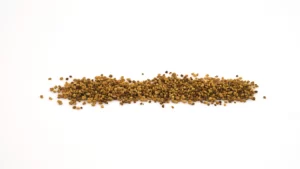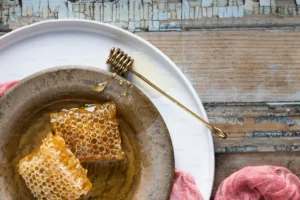Table of Contents
We all know that sugar should be enjoyed in moderation. Excess sugar consumption (which can come from soda, doughnuts, ketchup, and salad dressings) can lead to chronic inflammation, blood sugar issues, and increased risk of health conditions including obesity, Type 2 diabetes, and heart disease. High sugar intake has also been linked to poor mental health and depression.
The Trouble With Sugar
According to the CDC, Americans generally consume way too much added sugar. The American Heart Association recommends consuming roughly 6 teaspoons a day for women and 9 teaspoons a day for men, but the 2020–2025 Dietary Guidelines for Americans reports that Americans consume an average of 17 teaspoons of sugar per day(!).
Sugar is naturally found in many foods (hello, delicious fruit), but the sugar found in fruit is different from the white sugar you might add to your iced coffee or sprinkle over oatmeal. The naturally occurring sugar present in nutrient-dense, whole foods—like berries, beets, and sweet potatoes—is accompanied by dietary fiber (along with other excellent vitamins and minerals). This fiber helps slow down the digestion of the food, meaning the sugar gets released more slowly, therefore providing you with more sustained energy.
Sugar that’s been processed, refined, or added to food products, however, hits the body much faster. It’s high in calories without the silver lining of also providing any essential nutrients (read: sugar is the opposite of nutrient-dense). Simply put: “Sugar has no nutritional value, so most people do benefit from limiting it,” says Samantha Cassetty, MS, RD, registered dietitian and coauthor of Sugar Shock. “Any sweetener produces a rise in blood sugar followed by a surge in insulin to help deliver sugar to your cells. Over time, too much sweetener of any kind can promote insulin resistance and type 2 diabetes.”
To curb sugar intake, you’ve likely heard the advice to replace it with honey or maple syrup when you can. While these two sweeteners do provide more nutritional benefits than plain white sugar, here’s why you still need to be careful not to overdo it.
Maple Syrup vs. Sugar
Maple Syrup Nutrition Facts
Maple syrup comes from the sap of maple trees: It’s collected, boiled, filtered, and graded. One tablespoon of maple syrup contains 52 calories, 13.4 grams of carbohydrates, 0 grams of fiber, and 12.1 grams of sugar, according to the USDA FoodData Central. Its protein and fat content is negligible, but it is a source of numerous vitamins and minerals.
Maple Syrup Health Benefits
How does its nutritional lineup compare to sugar? Granulated sugar does have more calories, slightly fewer grams of carbohydrates, and slightly more grams of sugar than maple syrup, per the USDA. It’s unlikely you’d consume this amount in a sitting, but to compare equivalent amounts: 100 grams of granulated sugar contains 387 calories, while 100 grams of maple syrup contains 260 calories.
“Maple syrup has a nutritional advantage over sugar because it does not contain any additives, and the processing allows it to retain its nutrients, including manganese, riboflavin, zinc, magnesium, calcium, and potassium,” says William Dixon, MD, clinical assistant professor at Stanford School of Medicine and practicing emergency medicine physician.
In terms of health benefits, pure maple syrup offers a few. It has a lower glycemic index than sugar, so it won’t spike your blood sugar levels as quickly. Maple syrup is also known for possessing antioxidants, which are substances that help our cells fight off oxidative stress and protect against disease.” Maple syrup is rich in antioxidants that protect against the initiation of diseases, including heart disease, cancer, and brain disorders,” Cassetty says. “Maple syrup also has anti-inflammatory and prebiotic activity, so it helps support gut health and may guard against various illnesses.”
Honey vs. Sugar
Honey Nutrition Facts
Honey is the flower nectar collected by bees. This sweet, golden stuff is known for having antibacterial and antioxidant properties, making it beneficial for protecting against infections and disease.
A tablespoon of honey contains 63.8 calories, 17.3 grams of carbohydrates, and 17.2 grams of sugar, according to the USDA. It’s devoid of fat and contains insignificant amounts of protein and fiber.
Honey Health Benefits
While honey comes with more calories, carbohydrates, and grams of sugar than white sugar does, it does have more nutrients and health properties to offer, and in some cases, it may be a healthier choice over sugar.
“Honey’s advantages over sugar include a slightly lower glycemic index (i.e. it doesn’t affect your blood-sugar levels as much),” Dr. Dixon says. “It also contains more vitamins, minerals, and antioxidants, such as calcium, potassium, vitamin C, zinc, phenolic acids, and flavonoids.”
“Honey has bioactive substances that promote health,” Cassetty adds. “The antioxidants in honey help guard against disease-promoting cellular damage and feed the beneficial bacteria in your gut. Improved gut health is tied to lower levels of inflammation and a lower risk of numerous diseases.”
You might already reach for a bottle of honey when you’re sick as a sore throat salve and at-home cough suppressant. “Honey has anti-inflammatory and antibacterial properties,” Cassetty explains. “It’s even been found that honey is better at soothing a cough than an over-the-counter cough remedy.”
Should You Replace Sugar With Maple Syrup and/or Honey?
In some cases, it may make sense to swap out sugar for maple syrup and honey. Both of these natural sweeteners have a lower glycemic index than regular sugar and offer a wider profile of vitamins, minerals, and antioxidants. If you’re going to reach for one over the other, maple syrup contains the fewest sugars, calories, and carbohydrates per serving.
But before you go nuts adding maple syrup and honey to every dish you eat, note that they should still be enjoyed in moderation. At the end of the day, sugar is sugar, and both maple syrup and honey have a lot of it.
“Maple syrup and honey may have a few advantages over table sugar, but they’re both considered to be added sugars,” Dr. Dixon confirms. “There’s strong evidence that higher sugar intake is associated with an increased risk for cardiovascular disease, type 2 diabetes, metabolic syndrome, some cancers, and obesity.”
In particular, “[p]eople [who need to watch] their blood sugar should treat honey, maple syrup, and sugar very similarly in that they are all still sugar, and all of these sweeteners will spike blood sugar to a certain extent,” says Jenna Volpe, RDN, LD, CLT, functional dietitian nutritionist. And there’s certainly no need to start adding them to your diet if you don’t use any sweetener to begin with. “One shouldn’t be looking at honey or maple syrup as a ‘source of antioxidants,’ but rather, as a tasty mealtime addition,” adds Rachel Fine, RD.
Bottom Line
While it’s true that having way too much sugar too often—in any form—can take a toll on your health, it also shouldn’t be completely vilified and feared. “All options can be included in a balanced and varied diet,” Fine says. Whatever your sweetener of choice, use it mindfully and in moderation, and do your best to follow the American Heart Association’s recommended guidelines of 9 teaspoons a day for men and 6 teaspoons a day for women.



